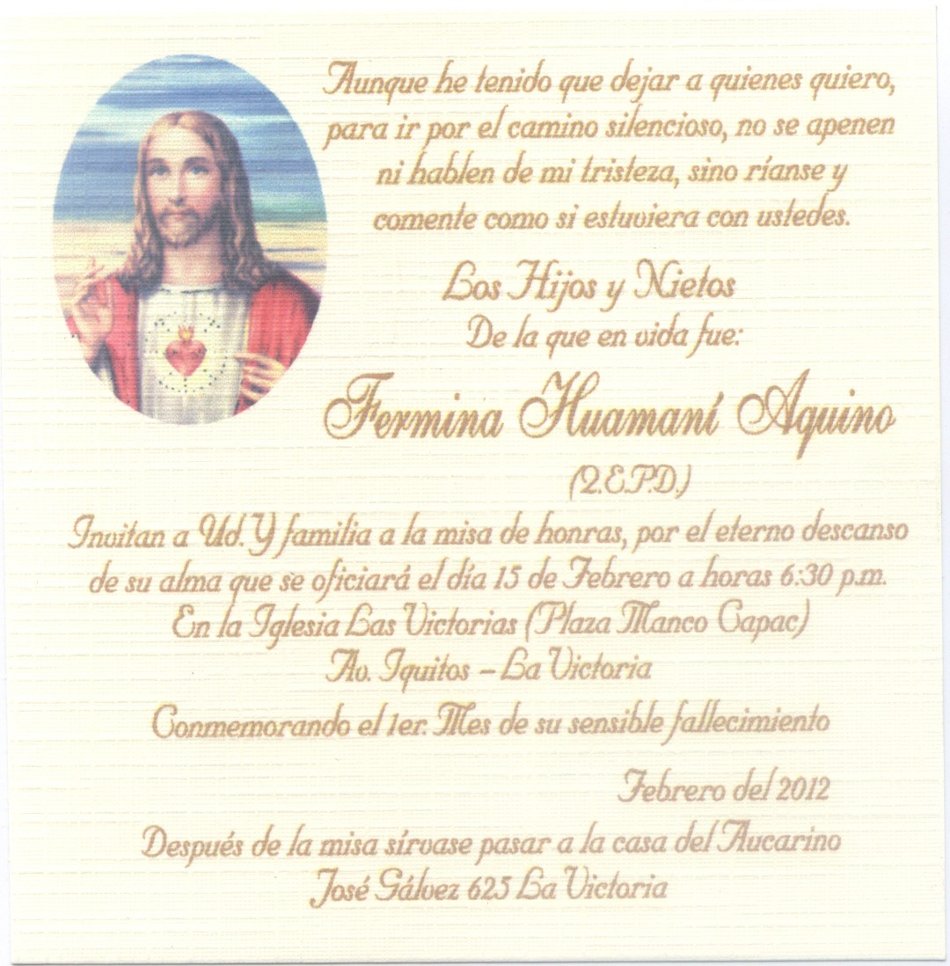
Death, it's the ultimate party crasher. And while no one wants to RSVP to that particular event, there are subsequent gatherings – the somber, reflective kind – that require a different sort of invitation. We're talking about the memorial mass invitation, often referred to as an invitación de misa de difunto in Spanish. These missives are more than just pieces of paper; they represent a connection to the departed, an invitation to communal mourning, and a step in the grieving process.
So, what's the big deal with these invitations? Well, they signal an important occasion, a religious service held to honor and remember someone who has passed. These services, often Catholic, provide a space for collective prayer and reflection. The invitation itself acts as a formal request for loved ones, friends, and acquaintances to join in this remembrance. It's a tradition deeply rooted in religious and cultural practices, offering comfort and solace to those affected by loss.
Historically, these invitations were elaborate, often featuring religious iconography and formal language. Think engraved script, heavy cardstock, and perhaps even a black border. As times have changed, so have the invitations. While some families still opt for the traditional approach, others choose simpler, more modern designs. The core purpose remains the same: to gather loved ones in remembrance.
Receiving a memorial mass card, or recordatorio de misa de difunto, often accompanies the invitation. This smaller card serves as a keepsake, bearing the deceased's name, photo, and sometimes a prayer or quote. It's a tangible reminder of the individual and a physical manifestation of shared memories. These cards, tucked into wallets or displayed in homes, offer a quiet, personal connection to the departed.
Navigating the etiquette surrounding these invitations can be tricky. Are you obligated to attend? What's the appropriate attire? Generally speaking, attending the mass demonstrates support for the grieving family. If you're unable to attend, sending a condolence card or reaching out personally is a thoughtful gesture. Traditional attire is typically subdued and respectful. Think dark colors, avoiding anything flashy or overly casual. The focus should be on honoring the deceased, not making a fashion statement.
The invitación de misa de difunto serves a vital function in the grieving process, offering a structured way to honor the deceased. It allows loved ones to gather, share memories, and find comfort in communal mourning. The act of attending the mass demonstrates support for the grieving family and helps to solidify the memory of the departed within the community.
Three key benefits of these invitations include providing a formal announcement of the service, ensuring a respectful remembrance of the departed, and facilitating community support for the grieving family. For example, the invitation clarifies the time and location of the mass, ensuring everyone can attend. The formal nature of the invitation underscores the significance of the event, and the gathering of loved ones offers comfort and strength during a difficult time.
When planning a memorial mass, consider these steps: first, consult with the church to schedule the service. Second, design and distribute invitations, ensuring they reach attendees with ample notice. Finally, prepare a reception or gathering after the mass to allow for continued sharing of memories and support.
Advantages and Disadvantages of Traditional Printed Invitations
| Advantages | Disadvantages |
|---|---|
| Formal and respectful | Can be expensive |
| Tangible keepsake | Time-consuming to design and distribute |
| Follows tradition | May not reach everyone |
Frequently Asked Questions:
1. What is an invitación de misa de difunto? Answer: A formal invitation to a memorial mass.
2. Do I have to attend if I receive an invitation? Answer: While not mandatory, attending shows support for the grieving family.
3. What is appropriate attire? Answer: Subdued and respectful clothing.
4. What is a recordatorio de misa de difunto? Answer: A memorial card serving as a keepsake.
5. Can I send a condolence card instead of attending? Answer: Yes, it's a thoughtful gesture.
6. Who should receive an invitation? Answer: Close family, friends, and acquaintances of the deceased.
7. How far in advance should invitations be sent? Answer: At least a week or two before the service.
8. What information should be included in the invitation? Answer: Date, time, location of the mass, and any subsequent gatherings.
Tips for creating a meaningful invitation: Personalize it with a photo or quote that reflects the deceased's life. Ensure all information is accurate and easy to read. Consider the tone and language to be respectful and appropriate.
In conclusion, the invitación de misa de difunto, or memorial mass invitation, holds deep significance within certain cultural and religious traditions. It serves as a formal announcement of a memorial service, a request for communal remembrance, and a symbol of respect for the deceased. While the design and distribution methods may have evolved over time, the core purpose remains: to gather loved ones in a shared expression of grief and celebration of life. By understanding the history, etiquette, and importance of these invitations, we can better navigate these sensitive occasions and offer meaningful support to those who are grieving. Taking the time to participate in these rituals offers comfort, strengthens community bonds, and ensures the enduring memory of those we have lost. The invitation, a small piece of paper, carries a weight of tradition and emotion, connecting the living to the memory of the departed.
Unlocking little voices exploring free articulation screenings
Can your first love be your last exploring enduring romance
Creating calm spaces with a beige color scheme












